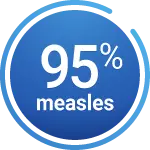Subcutaneous administration
Help protect against measles, mumps, and rubella with high immune response rates starting after the first dose
In a clinical trial of 284a patients, M-M-R®II seroconversion rates were high after the first dose.



aClinical studies of 284 triple-seronegative children 11 months to 7 years of age, demonstrated that subcutaneously administered M-M-R®II is highly immunogenic. In these studies, a single injection of the vaccine induced measles hemagglutination-inhibition (HI) antibodies in 95%, mumps neutralizing antibodies in 96%, and rubella HI antibodies in 99% of susceptible individuals.
M-M-R®II immunization provides coverage that can last over 10 years
Based on data from a clinical study, neutralizing and ELISA antibodies to MMR viruses were still found years after primary vaccination.
Antibodies were detected 11–13 years after primary vaccination in:
95%–100%
of individuals against measles
74%–91%
of individuals against mumps
90%–100%
of individuals against rubella
Similar immune responsesa when administered intramuscularly vs subcutaneously1
aSeroresponse rates (SRR): Percentage of children seronegative at baseline who achieved antibody titers > the seroresponse thresholds defined as 255 mIU/mL, 10 EU/mL, and 10 IU/mL for anti-measles virus, anti-mumps virus, and anti-rubella virus antibodies, respectively, obtained 6 weeks postvaccination.
Lower bound of the 95% CI of the seroresponse rates was >90% after IM administration for measles, mumps, and rubella.
Study Design:
In an open label clinical trial (NCT00432523), 752 children 12 through 18 months of age received M-M-R®II either intramuscularly (n=374) or subcutaneously (n=378), concomitantly with VARIVAX® (Varicella Virus Vaccine Live). For each vaccine antigen at least 89% of enrolled children were seronegative at baseline.
Noninferiority criteria for IM administration
Pre-specified criteria: Lower bound of the 95% CI for the difference in seroresponse rates (IM group – SC group) was ≥ -10%; noninferiority met for measles, mumps, and rubella.2
Post hoc analysis criteria: Lower bound of the 95% CI for the difference in seroresponse rates (IM group – SC group) was ≥ -5%; noninferiority met for mumps and rubella, narrowly missed for measles (-5.28%).
CI, confidence interval; IM, intramuscular; MMR, measles, mumps, rubella; SC, subcutaneous.

Actual size not shown
Looking to stock M-M-R®II in your practice?
Simply register or log in to your account to get started.

Dosage and administration
Discover the dosing regimen and administration of M-M-R®II.

ACIP recommendations
Find out about the ACIP recommendations for MMR vaccinations in pediatric patients.3
References
- U.S Food and Drug Administration (FDA). Statistical Review – Measles, Mumps, and Rubella Virus Vaccine Live. Updated March 8, 2023. Accessed July 24, 2023. https://www.fda.gov/media/166052/download
- Gillet Y, Habermehl P, Thomas S, et al. Immunogenicity and safety of concomitant administration of a measles, mumps and rubella vaccine (M-M-RvaxPro®) and a varicella vaccine (VARIVAX®) by intramuscular or subcutaneous routes at separate injection sites: a randomised clinical trial. BMC Med. 2009;7(16). https://doi.org/10.1186/1741-7015-7-16
- Centers for Disease Control and Prevention. Recommended child and adolescent immunization schedule for ages 18 years or younger, United States, 2023. Updated November 16, 2023. Accessed November 16, 2023. https://www.cdc.gov/vaccines/schedules/downloads/child/0-18yrs-child-combined-schedule.pdf

